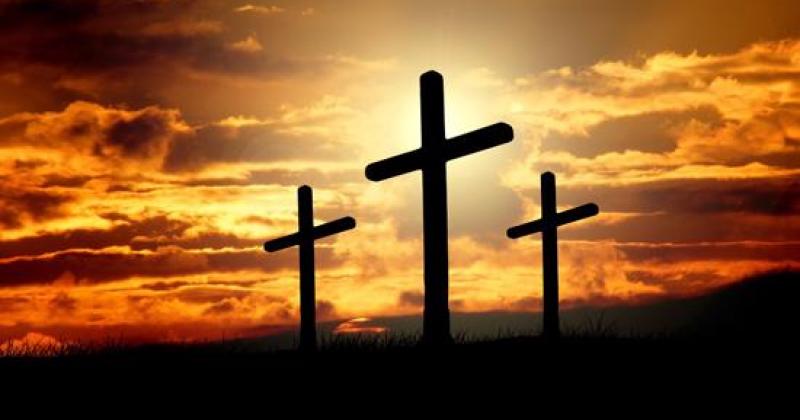On Passion Sunday and Good Friday many, perhaps most, churches have a dramatic presentation of the Gospel depictions of the Passion of Jesus. The congregation is forced to identify with the enemies of Jesus 2,000 years ago by crying out, "Crucify him!"
When I have been the celebrant at those Masses, I have felt relieved that my role exempts me from that call, since the priest gets to play Jesus.
In fact, the community with which I now celebrate does not do that semi-dramatized reading of the Gospels because the page-turning and reading ahead by the congregation to make sure they get their cues right can distract them from actually attending to the proclamation of the Word.
I think this is a good idea. And yet I recognize that something is lost in the congregation not having to shout, "Crucify him!" Even when our particular role in the drama exempts us individually from the shout, we know it is spoken on behalf of all of us, of each of us. And we don't like it.
Some of that distaste comes from embarrassment at the indignity of shouting in church. Some comes from a reluctance to call for the death of him whom we love. Some comes from a desire to not be one with the cruel crowd. Some of us may even be embarrassed by the fact that they sort of enjoy the exercise.
Calling for Jesus' crucifixion puts us, though, where we belong. Sometimes it is easy to forget that God loves and forgives us because God is love, and that is what love does. We do not earn that love by being good boys and girls. We are not. We are the ones who put Jesus on the cross. And it is essential for us to recall that in Holy Week.
Look at most pictorial representations of the Crucifixion and you will see that there are only two places one can be — on the cross or beneath it. There is only room for one on the cross, and he is there alone. Everyone else is beneath it. And that everyone else includes you and me.
Artists often show those below the cross in two groups, with Mary, the Beloved Disciple and Mary Magdalene on Christ's right and soldiers and scoffers on his left. If we could Photoshop ourselves into the picture, we would surely put ourselves on Jesus' right.
But that would mean forgetting or ignoring the fact that we are the ones who cry, "Crucify him!" That is not mere playacting. We dare not forget that Jesus is on the cross because of us, because of you and me. As St. Paul reminds us, "all ... are under the power of sin" and he goes on, quoting Psalm 14: "There is not one who is righteous, not even one." (Rom. 3:9-10)
In fact, there is only one group under the cross, the group of sinners whose only salvation is on the Cross. The Communion of Saints is, we must not forget, a subset of the Communion of Sinners. I am there. You are there.
We are there with Mary and the Beloved Disciple, but we are there also with the executioners and the scoffers. We are there with all the villains and victims of history. We are part of a mob that includes all the sinners of every time and place. And we belong there.
I said there is room for only one person on the cross. But there is room for something else: Death and Sin, the totality of Death and Sin throughout history. It is all there, carried by Christ. All our separation from God is there, so vast and weighty that it even so overwhelms Jesus that God the Son cries out his separation from the Father.
And we stand beneath the Cross and know that now it all belongs to God, and we are free. Now that we share death with God, it no longer need be a source of sin.
Death is, of course, universal. It is the engine that underlies life and drives evolution as individuals and species make room for their replacements. But apparently it is only we human beings that realize that universality and the fact that it embraces us, it embraces me.
My attempts to ignore that knowledge, to forestall or deny death's personal inevitability, are the source of sin.
God's embrace of death on the Cross means that death no longer is an invincible enemy because it is now the path to new life with God in the Resurrection.
That does not mean that death is no longer an ugly, fearsome reality. However, we can live with the confident fear we call hope because it is embraced by the life-giving love of God.
And that is the reason this week that begins with cries of "Crucify" and goes through a Friday of death that we call "Good" leads to Alleluias.
